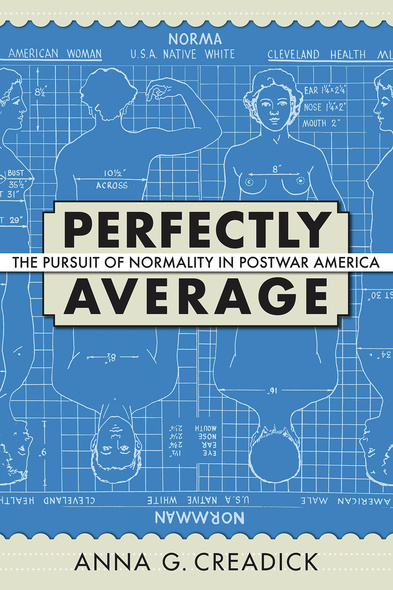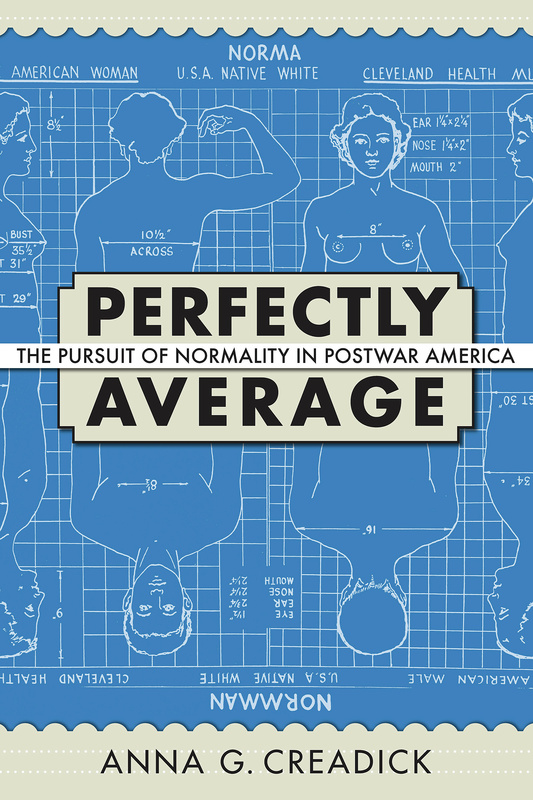Perfectly Average
The Pursuit of Normality in Postwar America
University of Massachusetts Press
At the end of World War II, many Americans longed for a return to a more normal way of life after decades of depression and war. In fact, between 1945 and 1963 the idea of "normality" circulated as a keyword in almost every aspect of American culture. But what did this term really mean? What were its parameters? Whom did it propose to include and exclude?
In Perfectly Average, Anna Creadick investigates how and why "normality" reemerged as a potent homogenizing category in postwar America. Working with scientific studies, material culture, literary texts, film, fashion, and the mass media, she charts the pursuit of the"normal" through thematic chapters on the body, character, class, sexuality, and community.
Creadick examines such evidence as the "Norm and Norma" models produced during the war by sexologists and anthropologists—statistical composites of"normal" American bodies. In 1945, as thousands of Ohio women signed up for a Norma Look-Alike contest, a "Harvard Study of Normal Men" sought to define the typical American male according to specific criteria, from body shape to upbringing to blood pressure. By the early 1950s, the "man in the gray flannel suit" had come to symbolize what some regarded as the stultifying sameness of the "normalized" middle class. Meanwhile, novels such as From Here to Eternity and Peyton Place both supported and challenged normative ideas about gender, race, and sexuality, even as they worked to critique the postwar culture of surveillance—watching and being watched—through which normalizing power functioned.
As efforts to define normality became increasingly personal, the tensions em-bedded in its binary logic multiplied: Was normal descriptive of an average or prescriptive of an ideal? In the end, Creadick shows, a variety of statistics, assumptions, and aspirations converged to recast "normality" not as something innate or inborn, but rather as a quality to be actively pursued—a standard at once highly seductive and impossible to achieve because it required becoming perfectly average.
In Perfectly Average, Anna Creadick investigates how and why "normality" reemerged as a potent homogenizing category in postwar America. Working with scientific studies, material culture, literary texts, film, fashion, and the mass media, she charts the pursuit of the"normal" through thematic chapters on the body, character, class, sexuality, and community.
Creadick examines such evidence as the "Norm and Norma" models produced during the war by sexologists and anthropologists—statistical composites of"normal" American bodies. In 1945, as thousands of Ohio women signed up for a Norma Look-Alike contest, a "Harvard Study of Normal Men" sought to define the typical American male according to specific criteria, from body shape to upbringing to blood pressure. By the early 1950s, the "man in the gray flannel suit" had come to symbolize what some regarded as the stultifying sameness of the "normalized" middle class. Meanwhile, novels such as From Here to Eternity and Peyton Place both supported and challenged normative ideas about gender, race, and sexuality, even as they worked to critique the postwar culture of surveillance—watching and being watched—through which normalizing power functioned.
As efforts to define normality became increasingly personal, the tensions em-bedded in its binary logic multiplied: Was normal descriptive of an average or prescriptive of an ideal? In the end, Creadick shows, a variety of statistics, assumptions, and aspirations converged to recast "normality" not as something innate or inborn, but rather as a quality to be actively pursued—a standard at once highly seductive and impossible to achieve because it required becoming perfectly average.
As Anna G. Creadick demonstrates in this brisk, persuasive study, the idea of the 'perfectly average' life represented a post-World War II reaction to the dual upheavals of the depression and the war. . . . [Creadick]'s study is a welcome reminder of why people pursued such unexceptional heights as 'normal.'—Journal of American History
'What makes this an especially compelling book is not only the thoroughness of the research but the ease with which difficult theoretical arguments are woven into the analysis. It is a very readable text.'—Ardis Cameron, author of Looking for America: The Visual Production of Nation and People
'What a powerful book! Anna Creadick convincingly demonstrates all the complexities and contradictions of the postwar American drive to create perfectly average citizens. . . . Her work brilliantly shows how ideals are enforced--and can be changed.'—John Howard, author of Men Like That: A Southern Queer History
'An eye-opening analysis of the pressures of conformity and the energetic resistance to them that shaped postwar America. Beautifully conceived and executed.'—Peter D. Kramer
'A compelling, fascinating study of the centrality of the value of normality as defining so many aspects of post-WW II US culture. . . . This absorbing, highly readable account is based on double-binding ironies: 'Normality presented an impossible combination of the typical and ideal: to achieve it, one would have to become perfectly average.' Highly recommended.'—Choice
'Normality is a slippery concept . . . to say that a given historical moment is normal to itself is tautological, and to say that its norms are not universal but relative over space and time is banal. Much more productive are questions about how normality is synthetized at particular historical moments, and to what ends. Under what conditions does an era come to feel normal by broad swathes of the population? What are the political forces at work in shaping norms? How do those norms feed back into culture and shape the very behavior they claim to reflect objectively and innocently? Anne Creadick's Perfectly Average engages precisely these questions.'—American Literary History
Anna G. Creadick is assistant professor of English at Hobart and William Smith Colleges.






